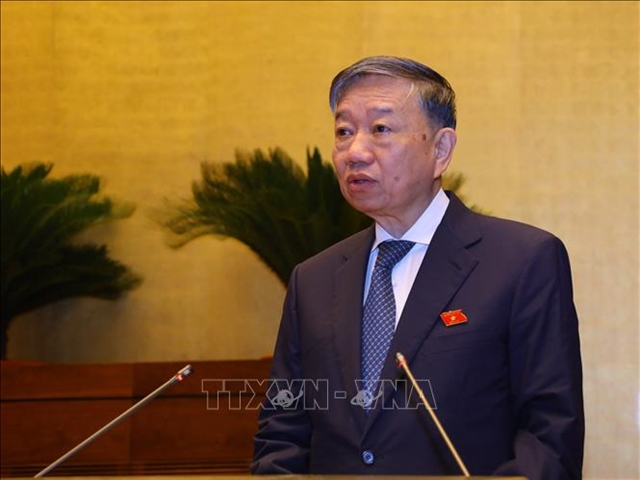 Society
Society


|
| Minister of Public Security Tô Lâm at the National Assembly on Friday. — VNA/VNS Photo |
HÀ NỘI — Minister of Public Security Tô Lâm has proposed to the National Assembly a draft resolution on piloting a model of organising job orientation and training outside of prisons for inmates.
Lâm said that in recent years, under the direction of the Government, the Ministry of Public Security has implemented solutions to make changes in criminal judgment performance.
During the criminal judgment enforcement, and particularly in prison sentence execution, the job orientation and training for prisoners encountered difficulties and problems, he said. A new mechanism is required to attract organisations and individuals to co-operate with prisons.
"However, at present, there is no relevant legal basis, which causes them difficulties in offering job orientation and training for prisoners," he said.
Once the NA's resolution on job orientation and training for prisoners is passed, it would help engage organisations and individuals to join the field, preparing prisoners to reintegrate community, he said.
Job orientation and training for inmates outside prison would be following the law on criminal judgment execution.
Accordingly, prisons are responsible for developing plans, directly managing and supervising training areas outside prisons.
Organisations and individuals that cooperate with prisons in job training are responsible for building facilities for detention management, handing them over to prisons for management, and coordinating with prisons in organising labour activities, job consultation and training for inmates.
Lâm said that the pilot implementation of the model of job orientation and training for prisoners outside prison must ensure four key principles.
Firstly, the job orientation and training must ensure safety and the community reintegration of prisoners, as well as create favourable conditions for inmates to find jobs after serving their prison sentences.
Secondly, inmates participating in job training must be on a voluntary and equal basis and be paid part of their labour, under the rights and obligations prescribed by the Law on Execution of Criminal Justice.
Thirdly, the People's Procuracy of the province where the prison is located shall directly supervise the execution of prison sentences in the working and training areas.
Fourthly, incomes that organisations earn from cooperating with prisons in job training for inmates during the pilot period are exempt from corporate income tax.
Chairwoman of the Judiciary Committee of the National Assembly Lê Thị Nga said that the committee agreed with the Government's proposal on the pilot model of job orientation and training for inmates outside prison.
"Once approved, the resolution will help remove difficulties and improve the efficiency of the re-education for inmates, creating conditions for inmates to work and easily re-integrating the community, and limit the risk of re-offending," she said.
The model also contributed to ensuring the correct use of land for national defence and security, and reducing the land for prisons, so that more land will be available for socio-economic development.
"The pilot results will create a practical basis for further improvement of the criminal law and criminal judgment execution," she said.
Discussing the proposed resolution, NA deputies suggested specific criteria to select eligible prisons and prisoners to participate in the job training model.
Deputy Phạm Trọng Nghĩa from Lạng Sơn Province said that job orientation and job training for prisoners outside the prison were in line with the provisions of international conventions.
Nghĩa said that in terms of public-private relations, world experience showed that many countries even allow the private sector to manage prisons, so private participation in judgment enforcement, including employment and job training was normal.
Clause 3, Article 1 of the draft resolution clearly states that: “Inmates participating in job orientation and training activities outside the prison must be on a voluntary and equal basis, be paid part of their labour and have the right to, obligations under the provisions of the Law on Execution of Criminal Judgments.”
Voluntariness has been emphasised and affirmed in the draft resolution, under the provisions of Convention 29 on forced and compulsory labour of 1930 and other international conventions, Nghĩa said.
He suggested that the agency in charge of assessing the proposal should consult with the International Labour Organisation in Hà Nội, and that the pilot scope should be limited to the domestic production sector. The pilot will be limited to 10 per cent of prisons, and the period should be three years rather than five years as proposed. — VNS




